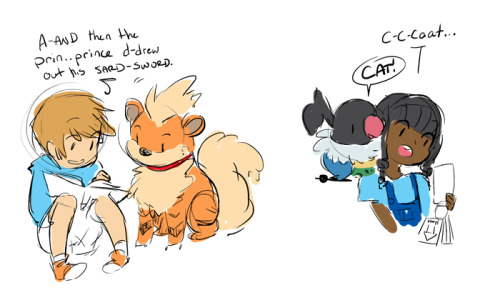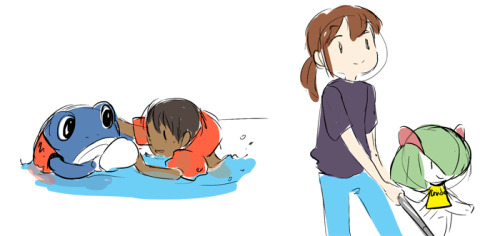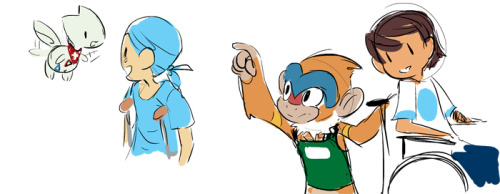I Think About Pokemon In Non-battle Situations A Lot. Like Pokemon Who Have Been Trained/raised To Be



I think about pokemon in non-battle situations a lot. Like pokemon who have been trained/raised to be helpers and assistants than to be battle partners.
Pokemon visiting hospitals to cheer patients up like dogs and cats do. Or ones that help kids learn to read, speak, swim, go through therapy?! Even pokemon who’s abilities help owners with specific disabilities?!
I love thinking of pokemon outside of battle situations.
More Posts from Penguin-penguin-penguin and Others
Surnames are just as important as given names. So, I compiled a list of the websites I use to find my surnames.
English Surnames
Dutch Surnames
Spanish Surnames
Scottish Surnames
German Surnames
Italian Surnames
Irish Surnames
French Surnames
Scandinavian Surnames
Welsh Surnames
Jewish Surnames
Surnames By Ethnicity
Most Common Surnames in the USA
Most Common Surnames in Great Britan
Most Common Surnames in Asia









hello hello
back again with some unhinged Seawing anatomy
I read a post and decided to make a separate post about it but it was about the rebellious phase teenagers go through and how invalidating it is that parents write off the phase as the result of hormones and irrational teenage anger. And it got me thinking, because I never really had that “rebellious phase of irrational anger.” The more I think about it, the more I think it’s because my parents never treated me like they expected me to rebel.
This has less to do with abusive parents (which was the point of that post and also the reason I’m making a new one) and more to do with the way western society in particular fosters parental expectations when kids reach adolescence. Because even kids who had previously good relationships with their parents sometimes hit really tumultuous times in adolescence, and I don’t think it is all hormonal.
There’s this real self-fulfilling prophecy with the relationship between parents and teens. Parents are told by their peers and elders (esp. THEIR parents) to “expect hell” when their kids reach adolescence. I remember my mom telling me once, right around the time I turned 13, that someone at her office said to her “uh oh, buckle in, this is when things get rough!” in reference to my being a teenager. My mom kind of shrugged it off and told me “I’ve never understood people who want their kids to stay kids forever. You guys are more interesting every year older you get. You’re becoming your own people.”
And that was that. My parents didn’t TELL me I was about to get rebellious and nasty to them, because they didn’t expect it of me. They told me I was becoming an interesting young person with my own thoughts and ideas. And because they didn’t expect me to be suddenly rebellious, they treated me like what I was: an interesting young person with my own thoughts and ideas. Someone who maybe still needed help with a few things now and then but by and large, they set expectations and gave me reasonable explanations for them, and I followed those expectations because they made sense.
My brother and I never had a curfew, for instance. Instead, my parents always just said, “let us know if you’re going to be out late so we don’t worry about you,” with the additional explanation that that’s something you should always do for the people who you share a house with, as a courtesy. They also modeled the behaviors themselves: we would leave a chair with a note in it by the front door if we were going out somewhere so anyone coming home while we were gone would know where we were–this was in the age before cell phones, you understand–and that meant my parents did it for us kids too. After all, if they wanted to know where we were so they wouldn’t worry about us, it was just as important that we know where they were so we wouldn’t worry about them. Our feelings were treated with the same courtesy as theirs. They respected us, so we respected them.
When boundaries needed setting there were some rocky conversations, sure, and my mom and I are STILL on occasionally rocky ground when it comes to my weight/eating habits, but generally we came to reasonable conclusions. And I never “rebelled” because I didn’t have to. I wanted alcohol, my dad would’ve let me try his fancy beer (I never wanted it because it stank, and I still don’t, but I could’ve tried it if I’d wanted to). I had questions about sex, my mom explained things clinically and asked if I had any questions. I wanted to wear makeup, my mom’s only request was I save my allowance and buy my own instead of stealing hers. I wanted to dye my hair ridiculous colors? My mom hated it but always told me “It’s your hair,” (and I honestly think half the reason she hated it so much was I ruined a lot of her nice towels).
My parents accorded me with the freedoms I was naturally seeking with the expectation that I would be responsible with those freedoms, and because they expected me to be responsible, I just…was.
I’m not saying that will work with everyone of course, but I think there’s something to be said for creating an atmosphere of expectation too. If parents begin tightening the reins in anticipation of rebellion (as they are told to do), they are paradoxically providing teenagers with something to rebel against.
Start treating your teenager like a prisoner, and they’ll start trying to escape prison.

night doodle before bed
Hey btw, if you're doing worldbuilding on something, and you're scared of writing ~unrealistic~ things into it out of fear that it'll sound lazy and ripped-out-of-your-ass, but you also don't want to do all the back-breaking research on coming up with depressingly boring, but practical and ~realistic~ solutions, have a rule:
Just give the thing two layers of explanation. One to explain the specific problem, and another one explaining the explanation. Have an example:
Plot hole 1: If the vampires can't stand daylight, why couldn't they just move around underground?
Solution 1: They can't go underground, the sewer system of the city is full of giant alligators who would eat them.
Well, that's a very quick and simple explanation, which sure opens up additional questions.
Plot hole 2: How and why the fuck are there alligators in the sewers? How do they survive, what do they eat down there when there's no vampires?
Solution 2: The nuns of the Underground Monastery feed and take care of them as a part of their sacred duties.
It takes exactly two layers to create an illusion that every question has an answer - that it's just turtles all the way down. And if you're lucky, you might even find that the second question's answer loops right back into the first one, filling up the plot hole entirely:
Plot hole 3: Who the fuck are the sewer nuns and what's their point and purpose?
Solution 3: The sewer nuns live underground in order to feed the alligators, in order to make sure that the vampires don't try to move around via the sewer system.
When you're just making things up, you don't need to have an answer for everything - just two layers is enough to create the illusion of infinite depth. Answer the question that looms behind the answer of the first question, and a normal reader won't bother to dig around for a 3rd question.










Images that speak for themselves. By Eugenia Melamud watercolor_zhenya
・ 。 ☆∴ 。 * ・゚ *。★・ ・ *゚。 * ・ ゚。・゚★。 ☆゚・。°. * ゚。·・。 ゚ ゚ *.。☆。 ★ ・ * ☆ 。・゚*.。 * ★ ゚・。 * 。 ・ ゚☆ 。


flight
patreon poster for june
-
 jordosprout liked this · 1 week ago
jordosprout liked this · 1 week ago -
 starprincejelly liked this · 2 weeks ago
starprincejelly liked this · 2 weeks ago -
 imjusthereforsomereason liked this · 2 weeks ago
imjusthereforsomereason liked this · 2 weeks ago -
 pvkemvn reblogged this · 3 weeks ago
pvkemvn reblogged this · 3 weeks ago -
 penciledinfaces reblogged this · 3 weeks ago
penciledinfaces reblogged this · 3 weeks ago -
 chapolim45 liked this · 3 weeks ago
chapolim45 liked this · 3 weeks ago -
 myrebloggingarchive reblogged this · 3 weeks ago
myrebloggingarchive reblogged this · 3 weeks ago -
 myrebloggingarchive liked this · 3 weeks ago
myrebloggingarchive liked this · 3 weeks ago -
 missdragon42 liked this · 3 weeks ago
missdragon42 liked this · 3 weeks ago -
 dusky-star reblogged this · 3 weeks ago
dusky-star reblogged this · 3 weeks ago -
 redacted-doodle liked this · 4 weeks ago
redacted-doodle liked this · 4 weeks ago -
 curlyfray-art liked this · 1 month ago
curlyfray-art liked this · 1 month ago -
 bluexjayy reblogged this · 1 month ago
bluexjayy reblogged this · 1 month ago -
 tigersharktheautisticseawing reblogged this · 1 month ago
tigersharktheautisticseawing reblogged this · 1 month ago -
 tigersharktheautisticseawing liked this · 1 month ago
tigersharktheautisticseawing liked this · 1 month ago -
 beepawz liked this · 1 month ago
beepawz liked this · 1 month ago -
 greendragon995 liked this · 1 month ago
greendragon995 liked this · 1 month ago -
 thendlessvoid liked this · 1 month ago
thendlessvoid liked this · 1 month ago -
 probably-mae reblogged this · 1 month ago
probably-mae reblogged this · 1 month ago -
 probably-mae liked this · 1 month ago
probably-mae liked this · 1 month ago -
 epicmothgirl42069 liked this · 1 month ago
epicmothgirl42069 liked this · 1 month ago -
 callum-74 reblogged this · 1 month ago
callum-74 reblogged this · 1 month ago -
 callum-74 liked this · 1 month ago
callum-74 liked this · 1 month ago -
 a-very-zilly-gooze liked this · 1 month ago
a-very-zilly-gooze liked this · 1 month ago -
 iron-manatee liked this · 1 month ago
iron-manatee liked this · 1 month ago -
 floralgrizzly reblogged this · 1 month ago
floralgrizzly reblogged this · 1 month ago -
 gronkgal liked this · 1 month ago
gronkgal liked this · 1 month ago -
 many-things liked this · 1 month ago
many-things liked this · 1 month ago -
 cat-collections-agency liked this · 1 month ago
cat-collections-agency liked this · 1 month ago -
 inspiredwriterstory reblogged this · 1 month ago
inspiredwriterstory reblogged this · 1 month ago -
 inspiredwriterstory liked this · 1 month ago
inspiredwriterstory liked this · 1 month ago -
 killerz-an-angelkin reblogged this · 1 month ago
killerz-an-angelkin reblogged this · 1 month ago -
 killerz-an-angelkin liked this · 1 month ago
killerz-an-angelkin liked this · 1 month ago -
 stupidsandwitch3 liked this · 1 month ago
stupidsandwitch3 liked this · 1 month ago -
 whitelilyswife reblogged this · 1 month ago
whitelilyswife reblogged this · 1 month ago -
 whitelilyswife liked this · 1 month ago
whitelilyswife liked this · 1 month ago -
 wolfisobsessed reblogged this · 1 month ago
wolfisobsessed reblogged this · 1 month ago -
 wolfisobsessed liked this · 1 month ago
wolfisobsessed liked this · 1 month ago -
 dysfunctional-reblogs reblogged this · 1 month ago
dysfunctional-reblogs reblogged this · 1 month ago -
 dysfunctionaldogdude liked this · 1 month ago
dysfunctionaldogdude liked this · 1 month ago -
 crutc liked this · 1 month ago
crutc liked this · 1 month ago -
 thesoftrain liked this · 1 month ago
thesoftrain liked this · 1 month ago -
 yellow-computer-mouse reblogged this · 1 month ago
yellow-computer-mouse reblogged this · 1 month ago -
 goatwithtoast21 liked this · 1 month ago
goatwithtoast21 liked this · 1 month ago -
 tinylightbread liked this · 1 month ago
tinylightbread liked this · 1 month ago -
 osnii liked this · 1 month ago
osnii liked this · 1 month ago -
 nerf-cat reblogged this · 1 month ago
nerf-cat reblogged this · 1 month ago -
 nerf-cat liked this · 1 month ago
nerf-cat liked this · 1 month ago
Pemguins~ I'm sorry, but I do not have much money. I cannot afford to donate to anyone.
228 posts
